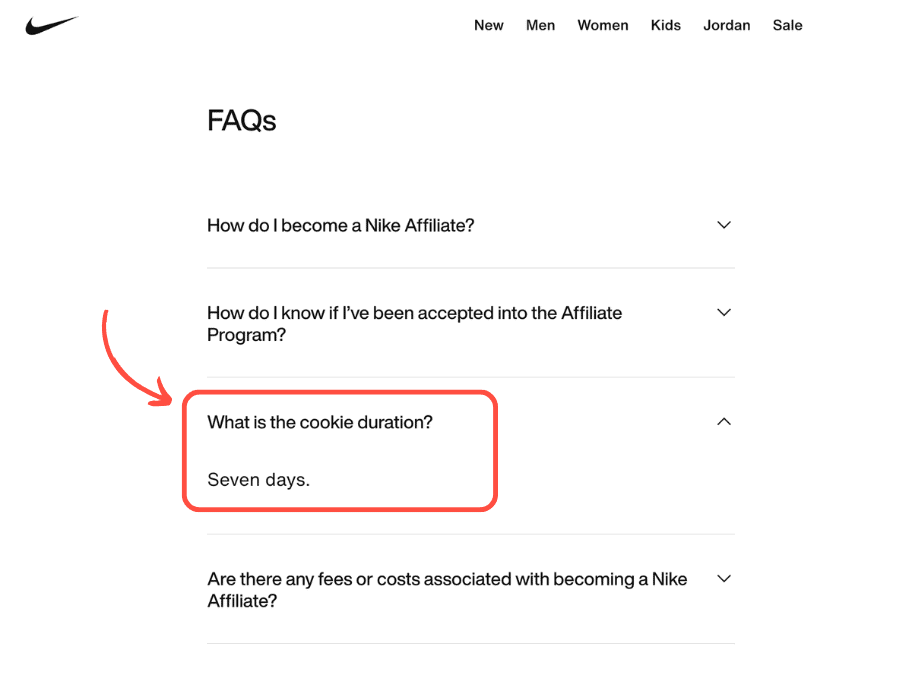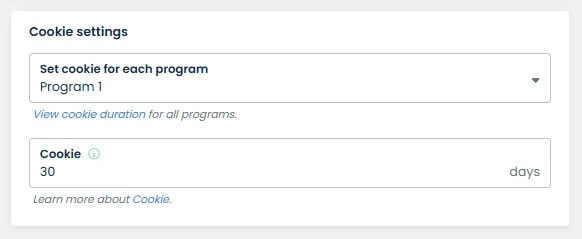“Cookie duration” is a familiar term in the affiliate marketing world. Of course, not the kind you dip in milk!
If you are a merchant wishing to start an affiliate marketing program—either through Shopify affiliate marketing system software or an affiliate network—cookie duration is one of the most important things you should learn about.
But what exactly does cookie duration mean in affiliate marketing? And why is it important to your affiliate campaign?
In this article, we’re going to provide you with detailed answers to all questions above. You’ll also know how long affiliate cookies last with real-world examples and how to decide on a good affiliate cookie window for your campaign.
Do you want to set cookie duration for your affiliate program quickly and then track referral sales accurately with peace of mind? Check out UpPromote, the top-recommended affiliate tracking app on Shopify, trusted by experts and over 115,000 users worldwide to start.
Potential Revenue with Affiliates (UpPromote)
Estimate the potential revenue when you recruit affiliates: comparing Current Business and Business + UpPromote.
Estimated Impact
Quickly visualize how affiliates can boost your orders and revenue.
Revenue Comparison: Current vs. with UpPromote
The chart illustrates relative revenue growth comparing two scenarios: organic sales vs. organic + affiliate-driven sales.
- Affiliate traffic quality is equal to your current traffic.
- AOV and Conversion Rate remain stable.
- Does not account for churn, refunds, or potential upsell/cross-sell.
Easily leave a trace in customers’ browser cookies and use cookie tracking to credit sales to the correct affiliate partners.
What is Affiliate Cookie Duration?
Cookie duration in affiliate marketing refers to the period during which an affiliate can earn a commission after a user clicks on their affiliate link. It’s a crucial factor for both affiliates and merchants, as it determines the window of opportunity for earning commissions and tracking sales.
Let’s see in detail how cookie duration works within an affiliate marketing program:
- A potential customer clicks on an affiliate link and lands on your store’s website.
- A cookie is stored in their browser, recording the affiliate who referred them.
- The cookie tracks how long it will stay active (the cookie duration).
- If the customer completes a purchase within this period, the affiliate will get a commission. In contrast, if the cookie expires before the purchase, the affiliate will get nothing.
For example, let’s say John refers a customer to Walmart through his affiliate link. And his link looks like this: https://www.walmart.com/?aid=123
When customers click on his affiliate link, a cookie containing the affiliate ID ‘123’ is stored on their devices, showing Walmart that John referred them.
If Walmart sets the affiliate cookie duration to 15 days, it means that if the buyers close the page and later return on the same devices within this timeframe (without using John’s affiliate link) to make purchases, the company can still identify John as the referrer and credit those sales to him, even if it didn’t happen right away.
Why Does A Cookie Duration Matter with Your Affiliate Program?
Cookie duration is one of the secret weapons that contribute to your affiliate program’s success. Here are the main reasons why:
Effectively track affiliate performance
Without cookies, it’s tough to know if a customer bought your product thanks to your marketing efforts or your affiliates’.
Setting a cookie duration helps you see exactly which affiliates are bringing in sales over a given period.
By setting a cookie range, you make sure that each affiliate gets the credit they deserve for the sales they help generate.
Easily attract affiliate signups
When affiliates compare different programs to join, cookie duration is one of the factors they look at. The longer the cookie duration, the more chances they have of earning commissions, leading to more sales for merchants. So, a good cookie duration can make your program more competitive and help attract more affiliate partners.
How Long do Affiliate Cookies Last?
Typically, cookie duration usually ranges from one day to several months. It varies across affiliate programs.
Below are some common types of cookie durations in affiliate marketing:
- Short affiliate cookie duration (less than 30 days)
- Long affiliate cookie duration (30 to 90 days or more)
- Lifetime cookie duration (never expires)
Short Affiliate Cookie Duration
What it is
Short cookie durations last less than 30 days, usually between 24 hours and 7 days. This is common for products that are impulse buys or seasonal promotions.
Pros and cons of short affiliate cookie duration
| Pros | Cons |
|
|
Examples of short affiliate cookie duration
- Amazon affiliate program
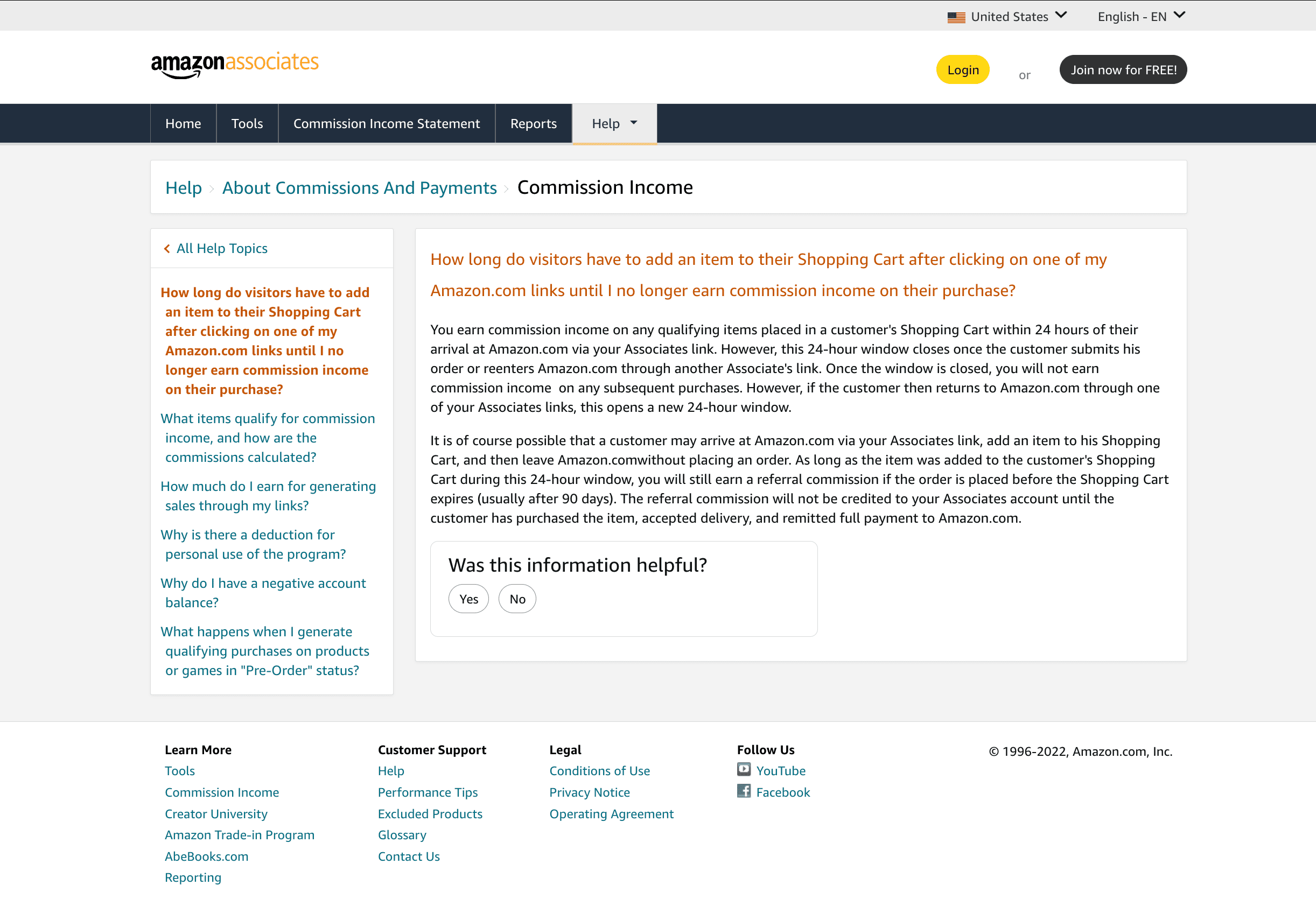
The most popular affiliate program, Amazon Associates, offers a 24-hour cookie lifespan. Yes, it’s just a day.
Even though the cookie duration is short, it works well for Amazon because of its huge product range and customer buying habits. The 24-hour policy applies to all products, so affiliates can still earn commissions if a user buys something other than the original product they clicked on.
Many Amazon shoppers make quick decisions, especially for low-cost or everyday items, so the short cookie period fits this behavior.
The short timeframe also means affiliates need to act fast to drive sales. If a purchase happens after the 24-hour window, the affiliate won’t get credit, which means lost commissions. To earn more, affiliates must encourage customers to make quick decisions.
- Nike affiliate program
Another well-known affiliate program with a short cookie window is Nike’s, which sets the duration at 7 days.
Long Affiliate Cookie Duration
What it is
Long cookie durations range from 30 to 90 days or even longer. This standard timeframe can be applied to various types of products and services, making it suitable for a wide range of industries.
Pros and cons of long affiliate cookie duration
| Pros | Cons |
|
|
Examples of long affiliate cookie duration
- Wilson affiliate program
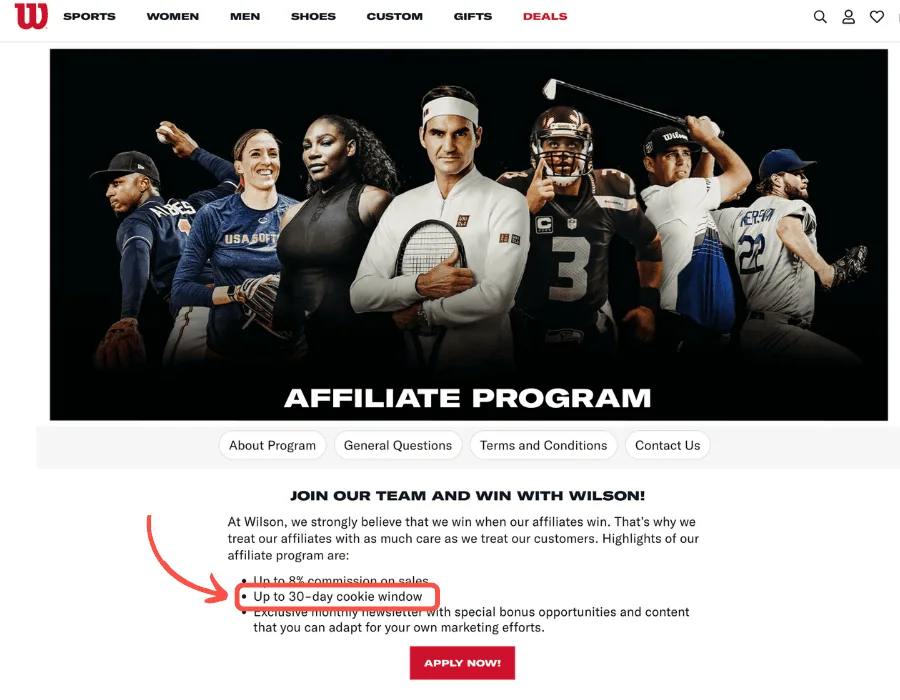
Wilson is famous for manufacturing high-quality sporting equipment and apparel. With a 30-day cookie window, any affiliate can earn commissions on sales via their links in that time.
- Foreo affiliate program
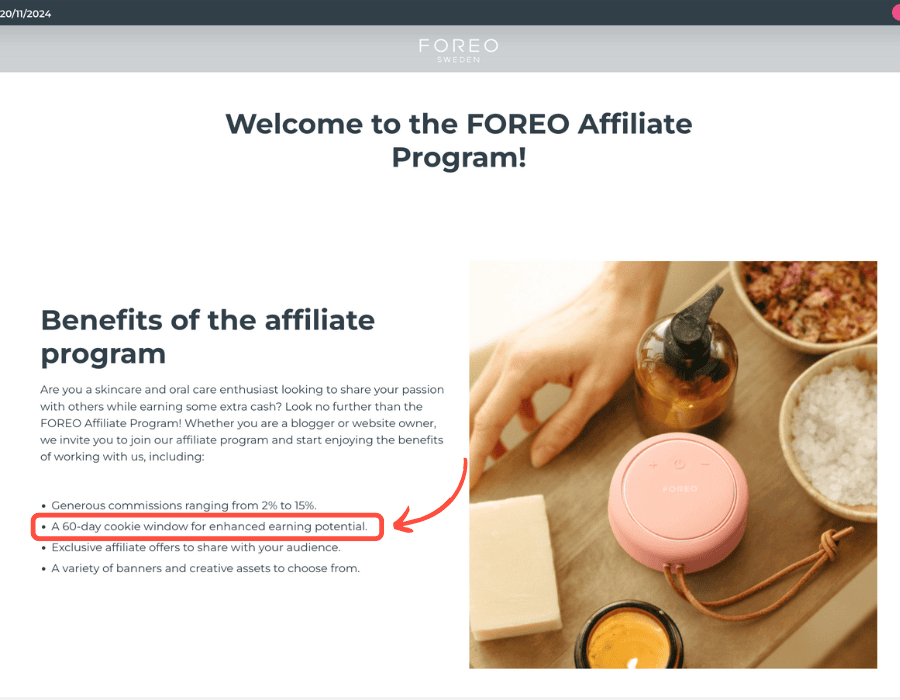
Foreo is a pioneer in providing diverse beauty-tech products, including LED masks, micro-foam cleansers, and so on. Its affiliate cookie lasts up to 60 days. This could help its affiliate marketers earn more through affiliate links.
- Freedom affiliate program
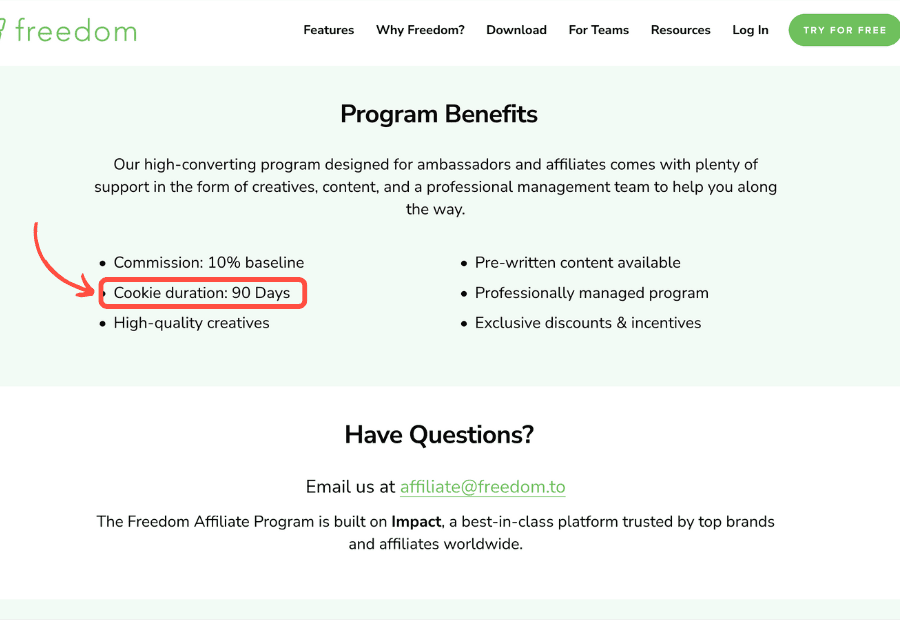
Freedom is among well-known app & website blockers that keeps users away from the Internet and focused on working or studying. Following the Freedom’s affiliate terms, affiliates receive a 90-day cookie duration.
- Seed Now affiliate program
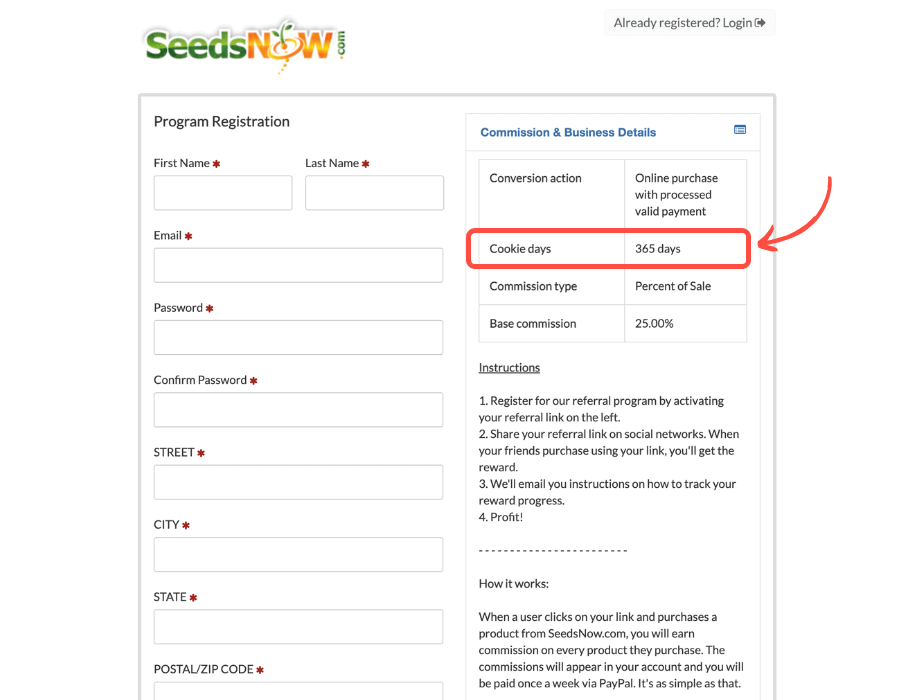
Seed Now is a favorite among gardening enthusiasts for its 100% organic seed collections. One thing that makes its affiliate program stand out is such a long cookie period: 365 days.
Join 115,000+ UpPromote users to ensure reliable affiliate cookie tracking & reward genuine affiliates only.
Lifetime Cookies
What it is
Lifetime cookie duration in affiliate marketing means the cookie never expires, so the affiliate earns commissions on future purchases by the same customer unless they clear their cookies or switch devices.
But these cookies are rare, and usually used for subscription services or products with high customer retention.
Pros and cons of lifetime cookie duration
| Pros | Cons |
|
|
Examples of lifetime cookie duration
- Asinzen affiliate program
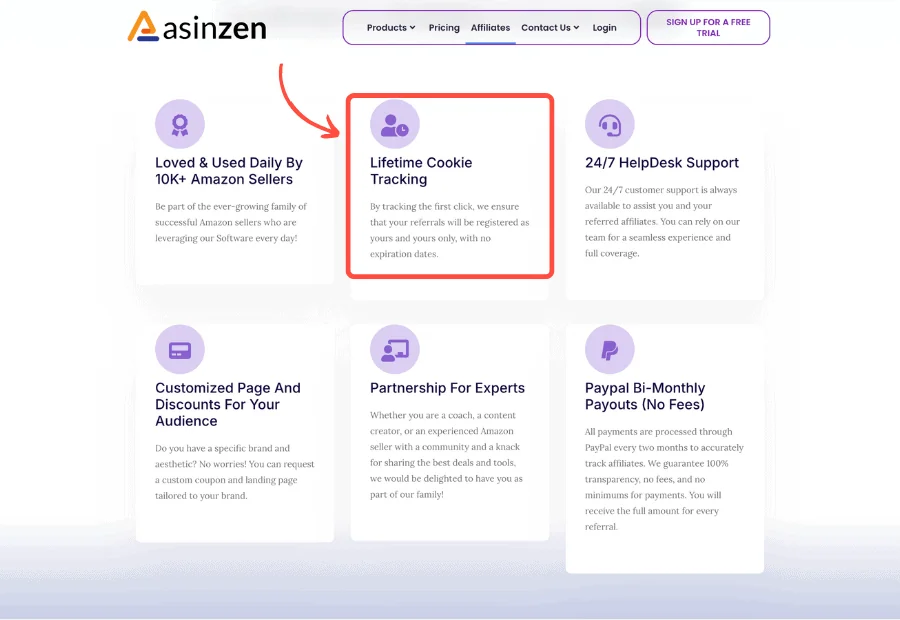
Asinze is a software company specializing in Amazon product research tools. The brand attracts a lot of affiliates to its program by offering lifetime cookie tracking.
- AdTector affiliate program
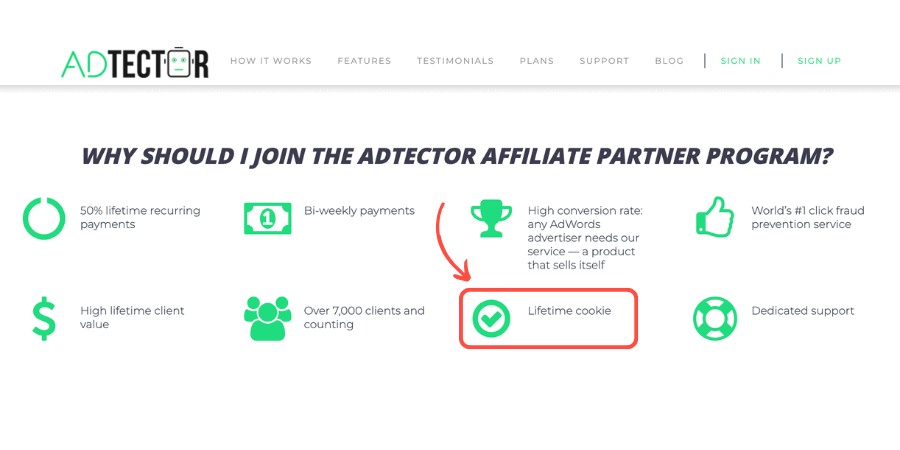
AdTector specializes in providing click fraud prevention services. Many affiliates love partnering with the company because of its lifetime cookie duration.
How to Choose the Perfect Cookie Duration For Your Affiliate Program
Affiliate cookie durations can differ greatly. But most programs set them between 1 and 30 days. The variation depends on how programs tailor their cookie policies to meet affiliate needs and support their marketing strategies.
To set the optimal cookie duration when creating your own affiliate campaign, here’s what to think about:
Match cookie duration to your product type and purchase cycle
- For high-value products: Longer cookie durations work best for products that need more research or time to decide on, like expensive or complicated items. This gives affiliates enough time to nurture leads and earn commissions on big purchases.
- For low-cost or impulse buys: Shorter cookie durations are often enough for cheaper items or things people buy quickly without much thought.
Look at your industry standards and competitors
- Check industry norms: See what cookie durations other affiliate programs in your field are offering. Having a longer cookie duration can give you an advantage and attract more affiliates.
- Analyze your competitors: If your competitors are offering longer cookie durations, you might need to match or even go beyond them to win over top-performing affiliates.
Consider your customer buying behavior
- Understand your audience: Look at your customer data to see how long it typically takes to make a purchase. If decisions take time, a longer cookie duration will ensure affiliates get rewarded.
- Access multiple touchpoints: If your customers compare products or do a lot of research before buying, a longer cookie duration can help capture sales from various affiliate channels.
Keep your affiliates motivated and retained
- Encourage long-term partnerships: Longer cookie durations show affiliates that you value their efforts and give them enough time to promote your products. This can motivate them to stick around.
- Be cautious of risks: Longer cookie durations can attract fraud, like cookie stuffing, so monitor for any suspicious activity.
Balance your revenue and cost
- Weigh the pros and cons: Longer cookie durations can boost sales but might also lead to paying more in commissions.
- Try alternative models: You can use other methods, like time-decay tracking, to fairly distribute commissions among affiliates without overpaying.
Choosing the right cookie duration is about finding what works best for everyone—your affiliates, your customers, and your business. Think about your products, how long people take to decide, and what others in your industry are doing. A good cookie duration shows your affiliates you value their efforts and helps you build strong partnerships while keeping your program profitable.
How to Set Affiliate Cookie Period with UpPromote
Now, do you want to build an appealing affiliate program with a great cookie duration to attract more affiliates to join and promote your brand?
Try UpPromote, the #1 affiliate marketing software on Shopify. Our system enables you to set your preferred cookie window in no time.
Use UpPromote to create a strong affiliate cookie window that helps your program outshine your rivals and makes it hard for top affiliates to ignore!
Step 1: Connect UpPromote to your store
Start by linking our app to your Shopify store.
If you don’t have a Shopify store yet, you can sign up for free and get your first month for only $1.
Next, find UpPromote in the Shopify app store and click Install.
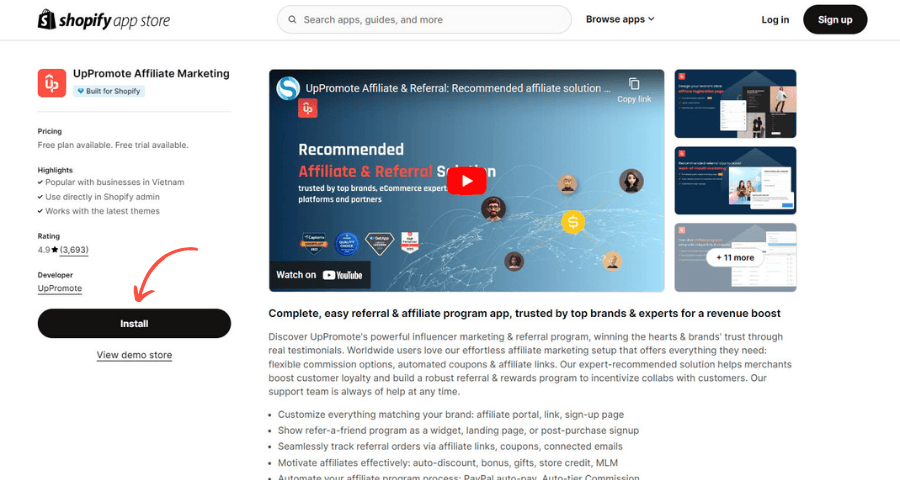
Step 2: Create your own affiliate program
After you link our app with your Shopify store, we’ll guide you through setting up an affiliate program and commission rates. There are built-in tooltips to help.
Don’t forget to tick to affiliate link as if you want to use cookie-based tracking method for your campaign.
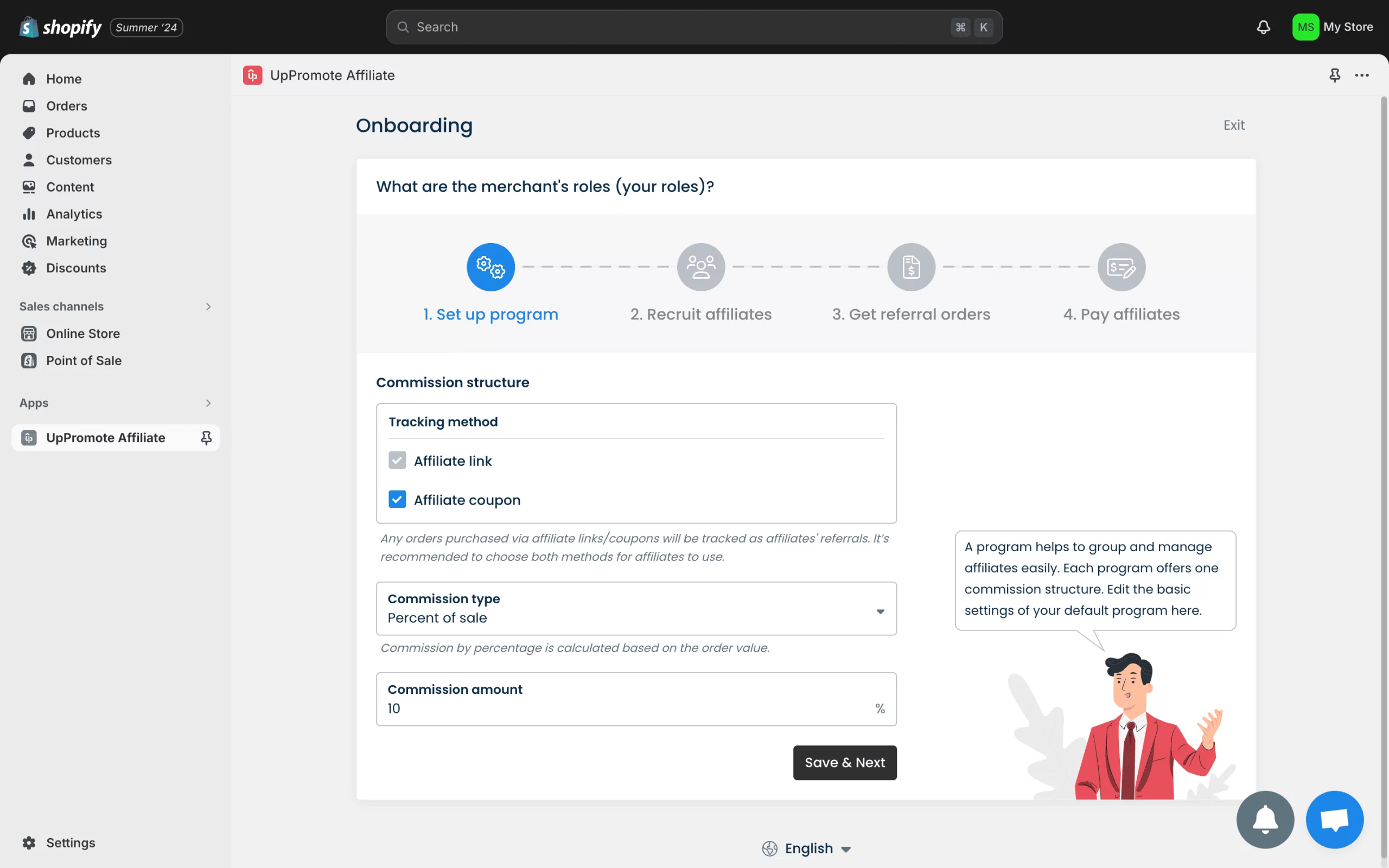
Step 3: Adjust affiliate cookie duration to fit your business need
After completing the setup with our guide, you’ll successfully launch your affiliate program. Next, set your preferred cookie duration for the program. You can easily adjust the cookie lifespan by navigating to Settings > System settings > General > Brand.
Actionable tips:
- Highlight your affiliate cookie duration on the signup page to attract potential affiliates.
- Comply with regulations such as the General Data Protection Regulation (GDPR) in the EU and the California Consumer Privacy Act (CCPA) in the US.
- Clearly outline your cookie policy in the affiliate terms and conditions to foster trust with partners.
- Implement safeguards against affiliate fraud, like cookie stuffing. This will keep your program’s integrity.
FAQs
1. What is cookie duration in affiliate marketing?
Cookie duration (cookie window) is the time span during which an affiliate tracking cookie remains active after a user clicks an affiliate link. If the user converts within this window, the affiliate is credited.
2. How does cookie duration affect affiliate commissions?
Longer durations increase the probability of attribution for delayed purchases; shorter durations favor last-click immediacy and often reduce affiliate payouts.
3. What is the typical cookie duration across industries?
Common ranges: 24 hours (Amazon-style) to 30 days (standard SaaS/ecommerce). High-consideration products may offer 60–365 days.
4. When does the cookie timer start?
At the moment the user clicks the affiliate link (first-party or third-party cookie set event).
5. How does cookie duration interact with lifetime commissions?
Cookie duration governs initial attribution; lifetime commission governs recurring payouts after the first conversion.
6. Does cookie duration apply across devices?
Not inherently. Standard cookies are browser/device-specific unless cross-device tracking (login-based or fingerprinting) is implemented.
7. What is the difference between cookie duration and session duration?
Session duration ends when the browser session closes; cookie duration persists beyond sessions until expiry.
8. How do ad blockers and privacy browsers affect cookies?
They may block or purge tracking cookies, shortening effective duration or nullifying attribution.
9. How should merchants choose an optimal cookie duration?
Align with buying cycle length, product price, and funnel complexity. Longer consideration → longer window.
10. Does a longer cookie duration attract better affiliates?
Yes. It signals fairness and increases expected EPC (earnings per click), improving recruitment and activation.
Final Words
As we have seen today, cookie duration is not only a technical aspect of affiliate marketing. It plays a crucial role in determining your program’s success, impacting how you track referral sales and reward affiliates.
With this knowledge in hand, you can stride forward with confidence into the colorful world of affiliate marketing. Remember, cookie duration is just one part of a winning affiliate marketing strategy. So, don’t be afraid to experiment and refine your approach to maximize results.
If you enjoyed this deep dive into cookie duration in affiliate marketing, please clap for this post. Also, leave a comment with your thoughts or questions, and check our blog for more insights.


